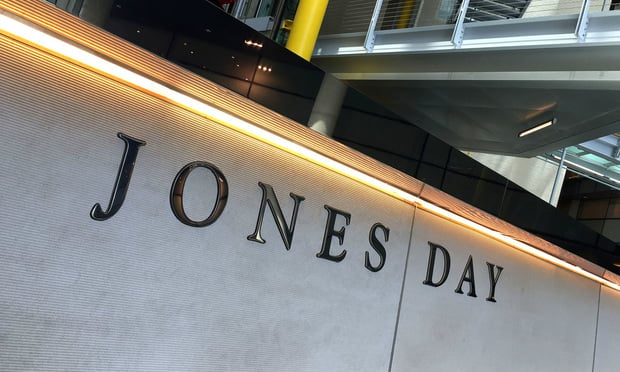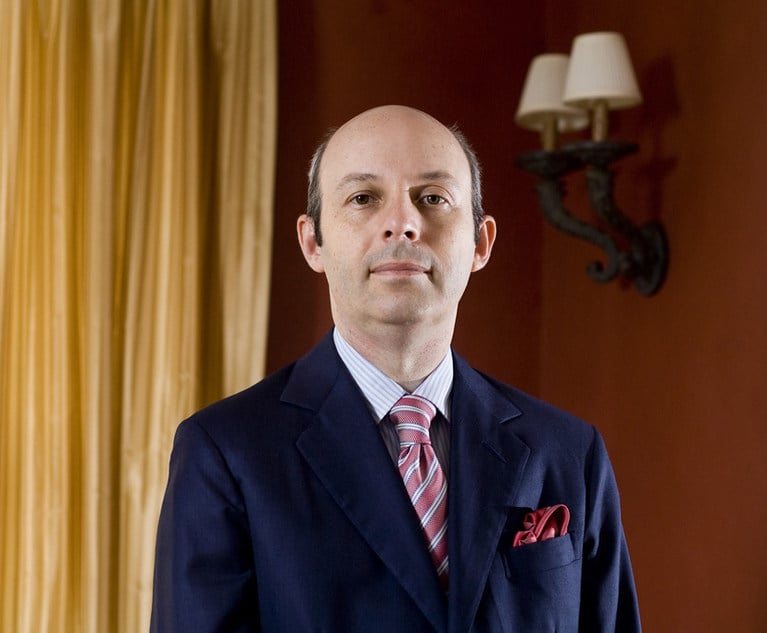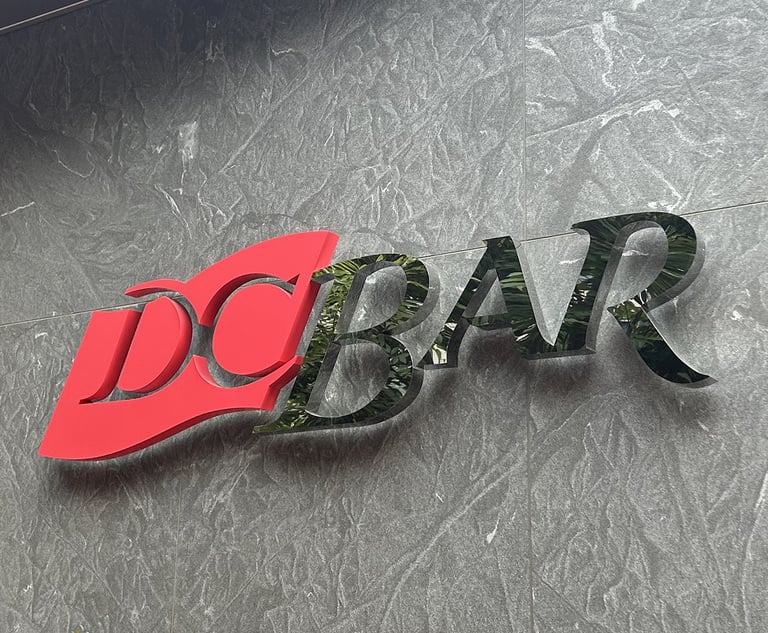Jones Day Warns of 'Protracted' Fee Fights if Circuit Ruling Is Upheld
"Although this particular fee award may not be of great importance, the standard of review for all fee awards assuredly is,” Jones Day's Eric Dreiband told the U.S. Court of Appeals for the Seventh Circuit. The firm claims a panel misapplied the applicable legal standard, and letting the ruling stand will invite "protracted fee litigation."
July 24, 2018 at 09:45 AM
4 minute read
 Jones Day offices in Washington, D.C. (Photo: Diego M. Radzinschi/ALM)
Jones Day offices in Washington, D.C. (Photo: Diego M. Radzinschi/ALM)
Jones Day lawyers, representing CVS Pharmacy Corp., are raising alarms that a federal appeals court decision that erased a fee award misapplied legal standards and will invite “protracted” litigation over compensation in future cases.
The U.S. Court of Appeals for the Seventh Circuit in June overturned a $307,000 fee award for the law firm, which had successfully challenged U.S. Equal Opportunity Commission claims that a CVS severance agreement unlawfully interfered with protected workplace rights.
The appeals court, finding the EEOC's case against CVS wasn't fruitless, vacated the legal fees awarded to Jones Day. The applicable fee statute, the court said, “does not punish a civil rights litigant for pursuing a novel, even ambitious theory.” The law firm on Monday asked the court to reconsider the decision stripping fees.
Jones Day's Eric Dreiband, leading the team for CVS, took issue with how the appeals panel resolved the fee dispute. The Seventh Circuit, according to lawyers for CVS, should not have granted “fresh” review but instead should have approached the dispute using a standard that gives greater deference to the trial court.
“Although this particular fee award may not be of great importance, the standard of review for all fee awards assuredly is,” Dreiband wrote in court papers. “The panel opinion gets it wrong and, worse, invites protracted fee litigation by promising de novo appellate review.”
Citing an earlier Seventh Circuit case, Dreiband, who is the Trump administration's nominee to lead the U.S. Justice Department's civil rights division, said it would be “'wasteful' for appellate courts to 'redo' a lower court's analysis of 'how far from the correct legal position' a party strayed.”
Neither Dreiband nor the EEOC responded to requests for comment. The EEOC will have a chance to respond to Jones Day's request for a rehearing.
The lawyers for CVS also are urging the Seventh Circuit to correct an alleged “legal misstatement” that could lead other courts astray. The Jones Day lawyers, including partner Yaakov Roth, argue the panel decision incorrectly stated the EEOC can litigate certain types of employment cases without an underlying charge.
The attorneys also contend the appeals court strayed in saying it was “questionable” whether legal fees can ever be awarded in scenarios where the EEOC violated a duty to try to resolve disputes before any lawsuit is filed.
The case is rooted in a 2014 lawsuit filed by the EEOC over a severance agreement the agency said limited the rights of employees to file complaints. The EEOC called the severance agreement “overly broad” and argued it was part of a CVS “pattern or practice of resistance” to restrict the civil rights of employees. The agency lost in the U.S. District Court for the Northern District of Illinois.
Dreiband, formerly the head of Jones Day's labor and employment group, in 2016 identified his hourly rate at $560, according to court papers in the case. Dreiband earlier served as general counsel to the EEOC from 2003 to 2005. Roth, a former clerk to the late Justice Antonin Scalia, billed at $475 per hour in 2016, and Nikki McArthur at $275 per hour, according to court records.
Read more:
7th Circuit Strips Jones Day's $307K Legal-Fee Award in EEOC Case
Jones Day Seeks $446K in Fees From EEOC After 'Baseless Suit' Goes Nowhere
DOJ Civil Rights Nominee Earned $2.2M at Jones Day
3 Key Moments From the Senate's Hearing on Trump's Civil Rights Pick
➤➤ Get employment law news and commentary straight to your in-box with Labor of Law, a new Law.com briefing. Learn more and sign up here.
This content has been archived. It is available through our partners, LexisNexis® and Bloomberg Law.
To view this content, please continue to their sites.
Not a Lexis Subscriber?
Subscribe Now
Not a Bloomberg Law Subscriber?
Subscribe Now
NOT FOR REPRINT
© 2025 ALM Global, LLC, All Rights Reserved. Request academic re-use from www.copyright.com. All other uses, submit a request to [email protected]. For more information visit Asset & Logo Licensing.
You Might Like
View All
SCOTUSblog Co-Founder Tom Goldstein Misused Law Firm Funds, According to Federal Indictment
2 minute read
'Lack of Independence' or 'Tethered to the Law'? Witnesses Speak on Bondi
4 minute read
DC Bar’s Proposed Anti-Discrimination, Harassment Conduct Rule Sees More Pushback

Full 8th Circuit Hears First Amendment Challenge to School District’s ‘Equity Training’
Trending Stories
- 1Bribery Case Against Former Lt. Gov. Brian Benjamin Is Dropped
- 2‘Extremely Disturbing’: AI Firms Face Class Action by ‘Taskers’ Exposed to Traumatic Content
- 3State Appeals Court Revives BraunHagey Lawsuit Alleging $4.2M Unlawful Wire to China
- 4Invoking Trump, AG Bonta Reminds Lawyers of Duties to Noncitizens in Plea Dealing
- 522-Count Indictment Is Just the Start of SCOTUSBlog Atty's Legal Problems, Experts Say
Who Got The Work
J. Brugh Lower of Gibbons has entered an appearance for industrial equipment supplier Devco Corporation in a pending trademark infringement lawsuit. The suit, accusing the defendant of selling knock-off Graco products, was filed Dec. 18 in New Jersey District Court by Rivkin Radler on behalf of Graco Inc. and Graco Minnesota. The case, assigned to U.S. District Judge Zahid N. Quraishi, is 3:24-cv-11294, Graco Inc. et al v. Devco Corporation.
Who Got The Work
Rebecca Maller-Stein and Kent A. Yalowitz of Arnold & Porter Kaye Scholer have entered their appearances for Hanaco Venture Capital and its executives, Lior Prosor and David Frankel, in a pending securities lawsuit. The action, filed on Dec. 24 in New York Southern District Court by Zell, Aron & Co. on behalf of Goldeneye Advisors, accuses the defendants of negligently and fraudulently managing the plaintiff's $1 million investment. The case, assigned to U.S. District Judge Vernon S. Broderick, is 1:24-cv-09918, Goldeneye Advisors, LLC v. Hanaco Venture Capital, Ltd. et al.
Who Got The Work
Attorneys from A&O Shearman has stepped in as defense counsel for Toronto-Dominion Bank and other defendants in a pending securities class action. The suit, filed Dec. 11 in New York Southern District Court by Bleichmar Fonti & Auld, accuses the defendants of concealing the bank's 'pervasive' deficiencies in regards to its compliance with the Bank Secrecy Act and the quality of its anti-money laundering controls. The case, assigned to U.S. District Judge Arun Subramanian, is 1:24-cv-09445, Gonzalez v. The Toronto-Dominion Bank et al.
Who Got The Work
Crown Castle International, a Pennsylvania company providing shared communications infrastructure, has turned to Luke D. Wolf of Gordon Rees Scully Mansukhani to fend off a pending breach-of-contract lawsuit. The court action, filed Nov. 25 in Michigan Eastern District Court by Hooper Hathaway PC on behalf of The Town Residences LLC, accuses Crown Castle of failing to transfer approximately $30,000 in utility payments from T-Mobile in breach of a roof-top lease and assignment agreement. The case, assigned to U.S. District Judge Susan K. Declercq, is 2:24-cv-13131, The Town Residences LLC v. T-Mobile US, Inc. et al.
Who Got The Work
Wilfred P. Coronato and Daniel M. Schwartz of McCarter & English have stepped in as defense counsel to Electrolux Home Products Inc. in a pending product liability lawsuit. The court action, filed Nov. 26 in New York Eastern District Court by Poulos Lopiccolo PC and Nagel Rice LLP on behalf of David Stern, alleges that the defendant's refrigerators’ drawers and shelving repeatedly break and fall apart within months after purchase. The case, assigned to U.S. District Judge Joan M. Azrack, is 2:24-cv-08204, Stern v. Electrolux Home Products, Inc.
Featured Firms
Law Offices of Gary Martin Hays & Associates, P.C.
(470) 294-1674
Law Offices of Mark E. Salomone
(857) 444-6468
Smith & Hassler
(713) 739-1250










